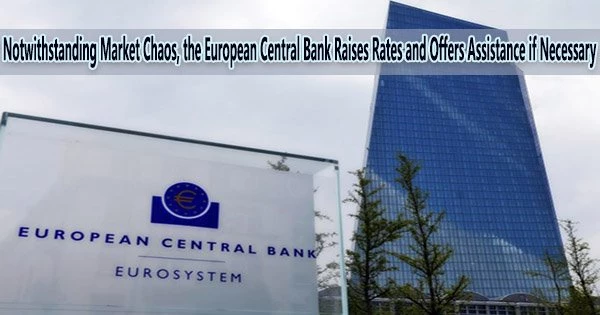In light of recent upheaval in the banking industry, the European Central Bank (ECB) on Thursday (March 16, 2023) announced a further rate increase of 50 basis points while indicating it is prepared to provide liquidity to banks upon request.
Given that inflation in the 20-member zone continues to be far above the target level, the ECB had been indicating for several weeks that it would be hiking rates once more at its meeting in March. In February, preliminary data showed headline inflation of 8.5%, well above the central bank’s target of 2%.
Some market players questioned whether President Christine Lagarde would still go ahead with the move, given recent shocks in the banking sector. Credit Suisse shares tumbled by as much as 30% in Wednesday intraday trade, and the whole banking sector ended the Wednesday session down by about 7%.
“Inflation is projected to remain too high for too long. Therefore, the Governing Council today decided to increase the three key ECB interest rates by 50 basis points,” the ECB said in a statement. One basis point is equal to 0.01%.
This latest move brings the bank’s main rate to 3%. It was in negative territory before July last year.
“The Governing Council is monitoring current market tensions closely and stands ready to respond as necessary to preserve price stability and financial stability in the euro area. The euro area banking sector is resilient, with strong capital and liquidity positions,” the central bank said in the same statement.
Inflation is projected to remain too high for too long. Therefore, the Governing Council today decided to increase the three key ECB interest rates by 50 basis points. One basis point is equal to 0.01%.
The European Central Bank (ECB)
Initial pressures on the banking sector emerged last week, when U.S. authorities deemed Silicon Valley Bank insolvent. The incident brought the bank’s overseas subsidiaries to an abrupt end and sparked questions about whether central banks are raising interest rates too quickly. Goldman Sachs quickly adjusted its rate expectations for the Federal Reserve, due to meet next week the bank now anticipates a 25 basis point increase, after previously forecasting a 50 basis point hike.
European officials were keen to stress that the situation in Europe is different from the one in the United States. Generally, the deposit concentration is lower. Deposit flows appear stable, and European banks are well capitalized following the regulatory changes that followed the global financial crisis. SVB was a significant lender to the tech and healthcare sectors.
Equity action Thursday showed some relief across the banking sector, after Credit Suisse said it will borrow up to $54 billion from the Swiss National Bank, the country’s central bank.
‘I was around in 2008’
Lagarde was keen to stress that the recent market turmoil is different from what happened during the global financial crisis of 2008.
“Given the reforms that have taken place, and I was around in 2008, so I have a clear recollection of what happened and what we had to do, we did reform the framework, we did agree on Basel III (a regulatory framework), we did increase the capital ratios … the banking sector is currently in a much, much stronger position,” Lagarde said during a news conference.
“Added to which, if it was needed, we do have the tools, we do have the facilities that are available, and we also have a toolbox that also has other instruments that we always stand ready to activate, if and when needed,” she added, reiterating that the central bank is ready to step in, if required.
Determined to bring down inflation
The ECB on Thursday also revised its inflation expectations. It now sees headline inflation averaging 5.3% this year, followed by 2.9% in 2024. In December, the bank had projected a 6.3% inflation figure for 2023 and a 3.4% rate in 2024.
Lagarde said the ECB remains committed to bringing down inflation.
“We are determined to return inflation back to 2% in the medium term, that should not be doubted, the determination is intact,” she said.
An open question remains: how quickly will the ECB proceed with further rate hikes? Until the recent market instability, expectations pointed to another 25 basis point increase in May, followed by the same move in June.
Lagarde did not provide an indication about future decisions.
“We know that we have a lot more ground to cover, but it is a big caveat, if our base line were to persist,” she said, highlighting that “the pace we will take will be entirely data dependent.”
















